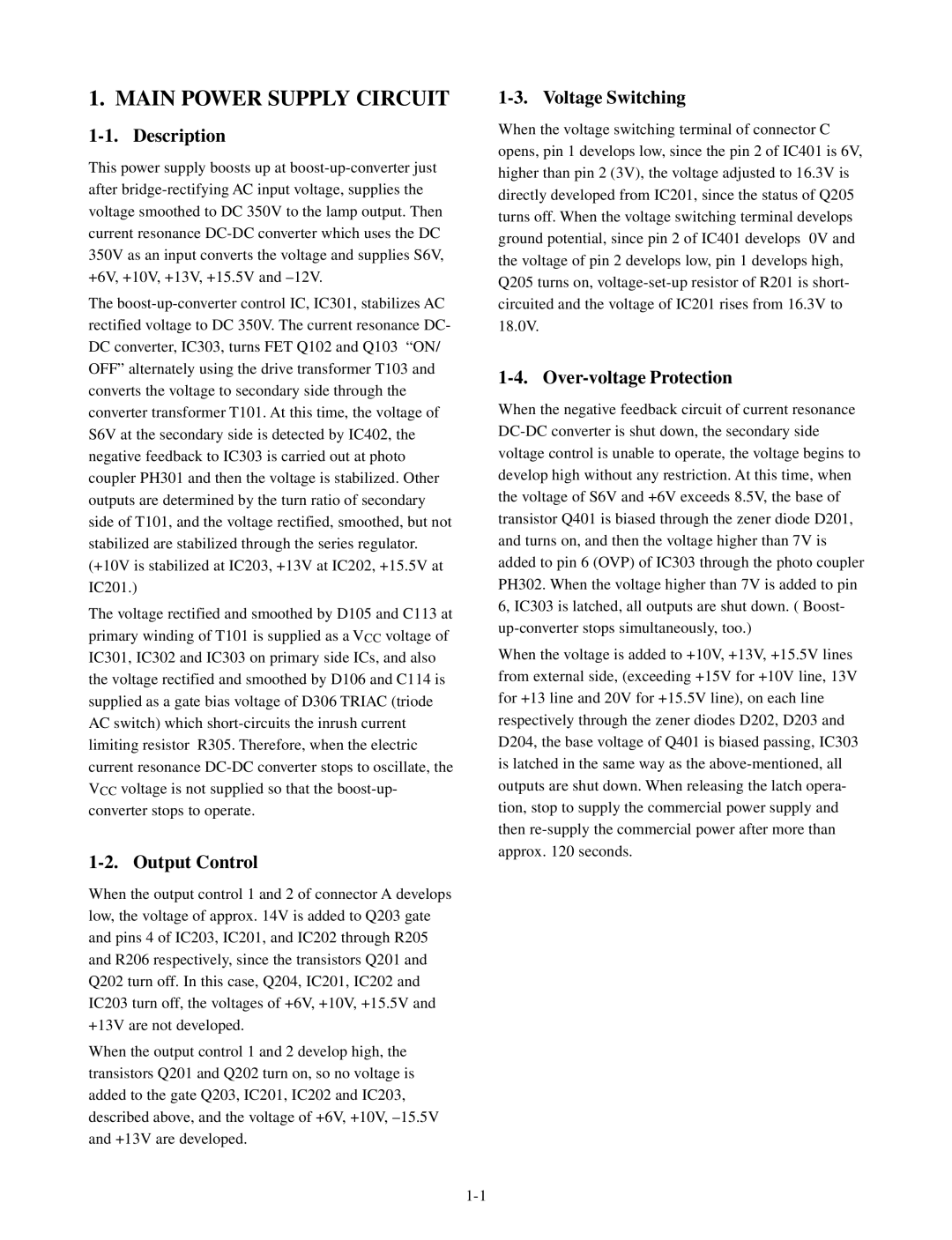1. MAIN POWER SUPPLY CIRCUIT
1-1. Description
This power supply boosts up at boost-up-converter just after bridge-rectifying AC input voltage, supplies the voltage smoothed to DC 350V to the lamp output. Then current resonance DC-DC converter which uses the DC 350V as an input converts the voltage and supplies S6V, +6V, +10V, +13V, +15.5V and –12V.
The boost-up-converter control IC, IC301, stabilizes AC rectified voltage to DC 350V. The current resonance DC- DC converter, IC303, turns FET Q102 and Q103 “ON/ OFF” alternately using the drive transformer T103 and converts the voltage to secondary side through the converter transformer T101. At this time, the voltage of S6V at the secondary side is detected by IC402, the negative feedback to IC303 is carried out at photo coupler PH301 and then the voltage is stabilized. Other outputs are determined by the turn ratio of secondary side of T101, and the voltage rectified, smoothed, but not stabilized are stabilized through the series regulator. (+10V is stabilized at IC203, +13V at IC202, +15.5V at IC201.)
The voltage rectified and smoothed by D105 and C113 at primary winding of T101 is supplied as a VCC voltage of IC301, IC302 and IC303 on primary side ICs, and also the voltage rectified and smoothed by D106 and C114 is supplied as a gate bias voltage of D306 TRIAC (triode AC switch) which short-circuits the inrush current limiting resistor R305. Therefore, when the electric current resonance DC-DC converter stops to oscillate, the VCC voltage is not supplied so that the boost-up- converter stops to operate.
1-2. Output Control
When the output control 1 and 2 of connector A develops low, the voltage of approx. 14V is added to Q203 gate and pins 4 of IC203, IC201, and IC202 through R205 and R206 respectively, since the transistors Q201 and Q202 turn off. In this case, Q204, IC201, IC202 and IC203 turn off, the voltages of +6V, +10V, +15.5V and +13V are not developed.
When the output control 1 and 2 develop high, the transistors Q201 and Q202 turn on, so no voltage is added to the gate Q203, IC201, IC202 and IC203, described above, and the voltage of +6V, +10V, –15.5V and +13V are developed.
1-3. Voltage Switching
When the voltage switching terminal of connector C opens, pin 1 develops low, since the pin 2 of IC401 is 6V, higher than pin 2 (3V), the voltage adjusted to 16.3V is directly developed from IC201, since the status of Q205 turns off. When the voltage switching terminal develops ground potential, since pin 2 of IC401 develops 0V and the voltage of pin 2 develops low, pin 1 develops high, Q205 turns on, voltage-set-up resistor of R201 is short- circuited and the voltage of IC201 rises from 16.3V to 18.0V.
1-4. Over-voltage Protection
When the negative feedback circuit of current resonance DC-DC converter is shut down, the secondary side voltage control is unable to operate, the voltage begins to develop high without any restriction. At this time, when the voltage of S6V and +6V exceeds 8.5V, the base of transistor Q401 is biased through the zener diode D201, and turns on, and then the voltage higher than 7V is added to pin 6 (OVP) of IC303 through the photo coupler PH302. When the voltage higher than 7V is added to pin 6, IC303 is latched, all outputs are shut down. ( Boost- up-converter stops simultaneously, too.)
When the voltage is added to +10V, +13V, +15.5V lines from external side, (exceeding +15V for +10V line, 13V for +13 line and 20V for +15.5V line), on each line respectively through the zener diodes D202, D203 and D204, the base voltage of Q401 is biased passing, IC303 is latched in the same way as the above-mentioned, all outputs are shut down. When releasing the latch opera- tion, stop to supply the commercial power supply and then re-supply the commercial power after more than approx. 120 seconds.
